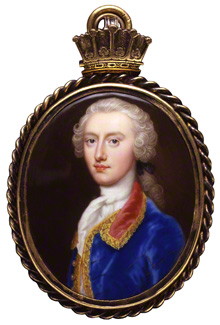“Some Vin de Champagne produced the desired effect”
I’ve been quoting from the report of a British secret agent on his—or possibly her—conversations with Julien-Alexandre Achard de Bonvouloir and the Chevalier d’Amboise at their hotel in London in the summer of 1775.
Those were aristocratic Frenchmen who had spent a few weeks in New England. Based on that deep knowledge, they told their acquaintance that all the fighting in Massachusetts could be settled:
The agent used a time-honored method: “stimulating the pride of Monsieur Le Comte de Beauvouloir in the moment that some Vin de Champagne produced the desired effect on his prudence.” The powerful combination of alcohol and flattery.
Bonvouloir then divulged that “he had had two Audiences of Le Comte de Guines,” the French ambassador to the British government (shown above). He boasted “that his Excellency had made him great offers of Service and had asked him twice to dinner.” As the younger son of a French nobleman, disabled enough that his military appointments were basically honorary, Bonvouloir yearned for recognition from such an important official.
The agent told whichever British Secretary of State he or she worked for (probably the Earl of Rochford though the report survives in the papers of the Earl of Dartmoouth):
The situation was quite the reverse. Bonvouloir was trying to become an emissary of his own government.
TOMORROW: Diplomatic missions.
Those were aristocratic Frenchmen who had spent a few weeks in New England. Based on that deep knowledge, they told their acquaintance that all the fighting in Massachusetts could be settled:
Lastly, that it appears to them both, the Americans had no settled, regular, well digested plan, that there exists among their Chiefs more Jealousy than unanimity: that many of the Settlers, and mostly all the Commercial people of Substance, begun to be tired of the present situation, and that they (the two french Officers) thought it probable Government would fall on Methods to disunite them, which if employed with success, would necessarily facilitate a reconciliation.The agent thought there was more to find out, though. These two Frenchmen were happy to talk about the British colonists in New England, but what about their own secrets? What were they really up to?
The agent used a time-honored method: “stimulating the pride of Monsieur Le Comte de Beauvouloir in the moment that some Vin de Champagne produced the desired effect on his prudence.” The powerful combination of alcohol and flattery.
Bonvouloir then divulged that “he had had two Audiences of Le Comte de Guines,” the French ambassador to the British government (shown above). He boasted “that his Excellency had made him great offers of Service and had asked him twice to dinner.” As the younger son of a French nobleman, disabled enough that his military appointments were basically honorary, Bonvouloir yearned for recognition from such an important official.
The agent told whichever British Secretary of State he or she worked for (probably the Earl of Rochford though the report survives in the papers of the Earl of Dartmoouth):
My Opinion is that the two french Officers are at this Instant in the Service of the Rebel Americans, and are paid by them; that they came over either with proposals to the Courts of France and Spain, or some other Commission in the American Interests, and that they intend to return to their Employers by means of some English Ship.In fact, there’s no surviving evidence that anyone in New England had even noticed Bonvouloir and D’Amboise, much less sent them to Europe with “proposals to the Courts of France and Spain.”
The situation was quite the reverse. Bonvouloir was trying to become an emissary of his own government.
TOMORROW: Diplomatic missions.

.jpeg)
